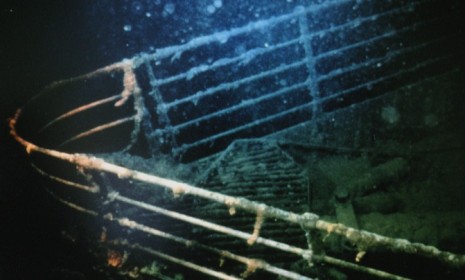The bug eating the Titanic
A newly discovered microbe is devouring rusty remnants of the ship. How much longer will the iconic wreck last on the ocean floor?

A free daily email with the biggest news stories of the day – and the best features from TheWeek.com
You are now subscribed
Your newsletter sign-up was successful
An iceberg brought down the Titanic almost 100 years ago, but it may be a ravenous microbe that completely destroys it. The International Journal of Systematic and Evolutionary Microbiology on Wednesday published an article announcing that a "newly discovered species of rust-eating bacteria" is chewing through the famous vessel, which was already in perilous condition when discovered on the Atlantic Ocean floor in 1985. Does this spell the ultimate end for the ill-fated ship? Here's a brief guide to the discovery:
What is this bacteria?
"Halomonas titanicae" — yes, it's named for the ship — was found on the ship's "rusticles," the "porous and delicate icicle-like structures that form on rusting iron." The Mir 2 submersible took samples of the ship's rusticles way back in 1991, but it took until now for university researchers from Spain and Canada to isolate and identify the new microbe. They had to sequence its DNA to learn that the microbe is a member of the "salt-loving" Halomonas genus.
The Week
Escape your echo chamber. Get the facts behind the news, plus analysis from multiple perspectives.

Sign up for The Week's Free Newsletters
From our morning news briefing to a weekly Good News Newsletter, get the best of The Week delivered directly to your inbox.
From our morning news briefing to a weekly Good News Newsletter, get the best of The Week delivered directly to your inbox.
How much longer will the Titanic survive?
When oceanographers discovered the Titanic on the ocean floor 25 years ago, it had already deteriorated significantly and had been broken into two massive sections. Since then, its condition has continued to deteriorate. "In 1995, I was predicting that Titanic had another 30 years," says Henrietta Mann, one of the study's authors. "It's deteriorating much faster than that now." As the ship dissolves into powder, eventually the only thing left will be "a rust stain."
Is there an upside to the discovery?
For oceanographers interested in how rust advances the decomposition of ships, you bet. The discovery could in fact be a "a scientific bonanza" for investigators who can "use information from its decay to research ways to protect future vessels." This could be useful in the disposal of old naval and merchant ships and oil rigs that have been cleaned of toxins and oil-based products and then sunk in the deep ocean.
A free daily email with the biggest news stories of the day – and the best features from TheWeek.com
Sources: Daily Mail, AOL, Red Orbit, Discovery
-
 Political cartoons for February 16
Political cartoons for February 16Cartoons Monday’s political cartoons include President's Day, a valentine from the Epstein files, and more
-
 Regent Hong Kong: a tranquil haven with a prime waterfront spot
Regent Hong Kong: a tranquil haven with a prime waterfront spotThe Week Recommends The trendy hotel recently underwent an extensive two-year revamp
-
 The problem with diagnosing profound autism
The problem with diagnosing profound autismThe Explainer Experts are reconsidering the idea of autism as a spectrum, which could impact diagnoses and policy making for the condition